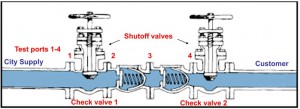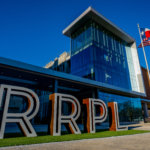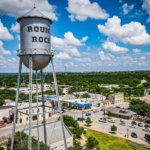You’re probably wondering, what the heck is a backflow preventer? Glad you asked! In the video above, Utilities and Environmental Services Director Michael Thane answers that question in a May 14 presentation to the City Council.
If you have a home with a sprinkler system or pool, you have a backflow prevention device. They are designed to protect the public water supply from contaminants.
Backflow occurs when there is a loss in water pressure (due to high demand, a water main break, etc.) which causes the water in your pipes to flow in the opposite direction – i.e., into the public water supply. For example, when a water main break occurs, the pressure drops significantly in the lines that feed your home, creating a suction effect in the pipe. That means water or other substances in your pipes are then drawn back into the City’s water supply.
It’s those other substances that are the primary cause for concern. Substances such as fertilizers and pool chemicals are present in private pipes that feed sprinkler systems and pools. As long as the backflow prevention device is working properly, there’s no cause for concern to the public water supply.
 Because backflow preventers are mechanical devices – they contain springs, internal seals and moving parts – they can wear down and/or break. Routine maintenance and testing is necessary to ensure the device is working properly. The City requires residential irrigation backflow prevention devices be tested every 7 years. Backflow devices for pools need to be tested annually.
Because backflow preventers are mechanical devices – they contain springs, internal seals and moving parts – they can wear down and/or break. Routine maintenance and testing is necessary to ensure the device is working properly. The City requires residential irrigation backflow prevention devices be tested every 7 years. Backflow devices for pools need to be tested annually.
If the backflow prevention device located at your property is registered in the City’s database, you will receive a letter from BSI Online 30 days prior to your testing due date. If you have a device that is not registered with the City, please contact Eric Warnke at 512-341-3177 or via email to register your device and determine when testing is necessary.
If you don’t comply with the testing, the City will charge you a $75 fine, plus the actual cost of testing the device. Testing costs range from $65 to $100.
For more information on the City’s Backflow Prevention Program, including a list of companies that conduct testing, visit roundrocktexas.gov/backflow.







